Game composer Lena Raine on her musical style: "I'm a big fan of musical metaphor"
Describing the sound world of Harmony: The Fall of Reverie.
Lena Raine's latest project is composing the score for Don't Nod's forthcoming narrative adventure Harmony: The Fall of Reverie.
Due out next month, it follows a young woman returning to her hometown to investigate the disappearance of her mother. Simultaneously, she's drawn into the parallel world of Reverie where she meets godlike Aspirations - Truth, Power, Bliss - and must balance the fates of each through narrative decision-making.
It's all presented in a colourful, animated style, but what really impressed me when I recently played the demo was Raine's score.
Perhaps best known for her work on Celeste and Chicory: A Colorful Tale, Raine's music in Harmony: The Fall of Reverie is both evocative and full of wistful melodies. I had the opportunity to ask her more about composing the score, so read on as we discuss her use of musical metaphor, the true purpose of game music, and who exactly is Marzipan?
Can you describe the musical world of Harmony: The Fall of Reverie? How did your compositional approach differ from previous games?
As soon as I began writing for Harmony, I knew I wanted to take it in the direction of analogue and digital sounds. Lots of synthesisers, lots of processing, lots of saturation. With a few exceptions, I wanted to limit how many 'real' instruments I was using, to be able to fully craft the aesthetic of the world.
How did you differentiate between the music of Reverie and the real world?
I'm a big fan of musical metaphor and so I immediately set up the ground rule for myself that physical instruments weren't allowed in Reverie. Only synthesisers and sounds that evoked real instruments. Because both Reverie and Brittle exist in lockstep, it was important that they both feel related, but distinct. You can even hear this happen in the second animated cutscene, where Polly enters Reverie. There's a big swell in the orchestral strings and then I literally take that sound and digitise it, transform it into the synth pad that then takes over the score for the exposition of Reverie.
Did you come up with separate themes for each of the Aspiration characters? If so, how did you compose these? What were your inspirations?
The Aspirations were some of the very first sketches I did for the game. Bliss, Chaos, and Bond were my test bed for exploring musical styles and creating a palette that I could draw from for the rest of the score. For each one, I wanted to write a sort of 'pop single' that epitomised their influence. For Bliss, I took a lot of classic retro chip sounds that matched her isolated bunker's overwhelming visuals. Chaos was all about unpredictability, uneven metres, oddly shaped phrases. I really got to flex my love of jazz fusion there, the most beautiful chaos I can think of. Bond was all about manipulating sounds in such a way to recreate the feeling of a dense mangrove jungle with bird cries and woodwinds; but all synthesised, of course. And that's just three of them!
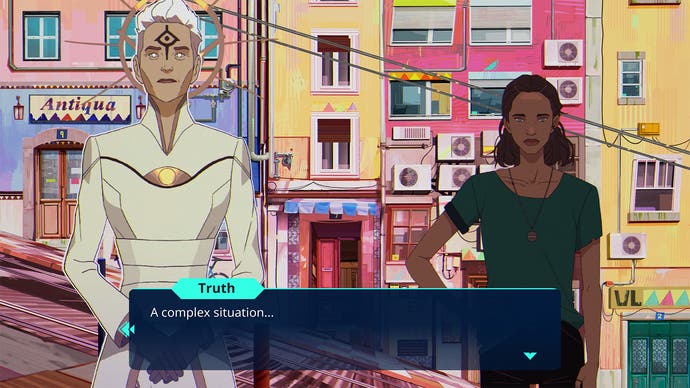
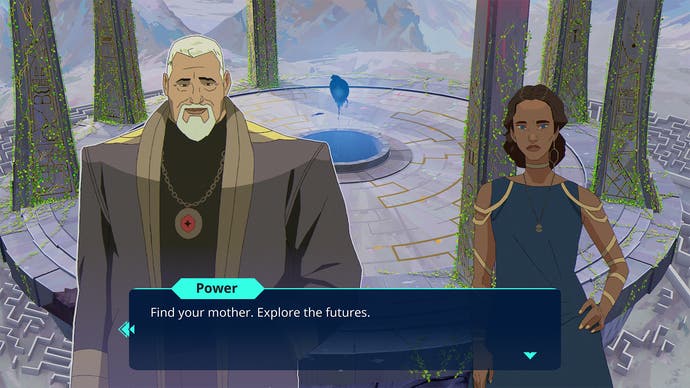
What were the main challenges when composing the music for the game?
With something like a narrative adventure game, if you look at classic examples of these, especially some of my favourite series like Ace Attorney, The Nonary Games, or even Nintendo's Famicom Detective Club games, you run into a lot of limitations in game music that have been passed down over the generations as conventions of the genre. Lots of individual looping themes, constantly cutting between them, using their starts, or even sudden ends, as dramatic emphasis. While I'm obviously inspired by all of these, it didn't mesh with the flow of Harmony, especially with how branching and variable every single playthrough is going to be. I wanted to take things a step further and score entire scenes with dynamic layers, so that the moments you do make big changes to your path, you hear that in the music. The challenge then became composing meaningfully dynamic tracks that could play out over longer periods of time but change in ways that feel tangible and rewarding.
To me, the music sounds immediately like a Lena Raine score - particularly in the focus on ambience and melody. How would you describe your sound/compositional style across all of your work?
Thank you! That always feels super encouraging to hear. It's something that is subconscious to how I write music but stems from my background as a vocalist and singing virtually everything to myself before I put a single note down on the computer. Melody encompasses so much of how I relate to music that it's hard for me to just write a piece that sinks solely into texture and rhythm. I do it, obviously, but I'm always humming something on top. This isn't directly related to the question but, what's interesting is that for Harmony, I deliberately only include the melody in the first loop of many of the themes. As it's the first game I've scored that has voice acting, I wanted to make sure the music gets out of the way when it needs to. So sometimes it'll just play the melody once, duck out, and then we'll bring it back in later for emphasis.
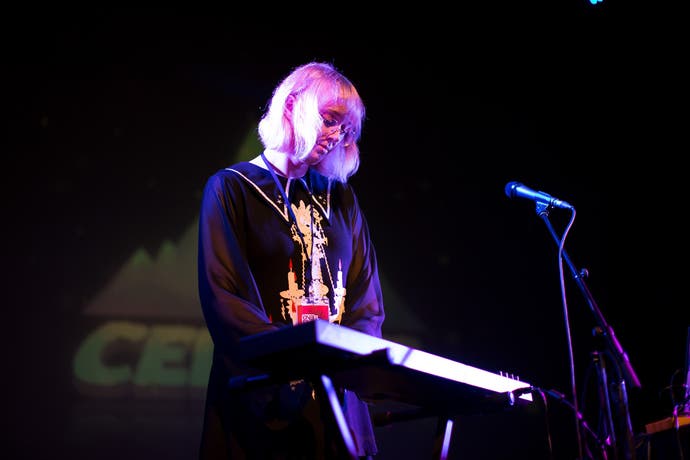
Your score for Celeste was mostly electronic (besides piano), while Chicory had a wider (more colourful - fittingly!) array of instruments. Why did you choose this instrumentation for these projects? How does Harmony differ?
Limitations are one of the most meaningful choices you can make in scoring a game. Giving yourself a palette to work with, much like an artist might choose their colours ahead of time, lets me make creative decisions that might be more interesting than simply throwing everything at the wall and seeing what sticks. Celeste's palette of piano and software synths came about from the first piece I wrote for the game and then leaning into it, which eventually became the thought that piano represented the lead character Madeline's internal journey, and the synths were the external world supporting her and pushing back against her. Chicory was all about deep diving into the idea of a physical object (the brush) being passed down through history and being the origin of all colour in the world. I took the idea of what if our first instruments, our original musical brushes, were passed down to modern times and played modern music. So, you have some of the first flutes, lutes, and drums all contributing to a modern-sounding score.
I spoke to it a bit above, but Harmony's palette came from my love of classic synthesisers and warm analogue sounds, which very quickly turned into a parallel portrayal of Reverie (synthesised sounds that reflect physical ones), and Brittle (physical instruments that reflect synthesised ones). Which is to say, even the real instruments I recorded for the game, are processed and distorted in some way to feel closer to the digital space, so that the entire score feels unified.
For me listening to your work, there's a real sense of playfulness but also an underlying tension, or anxiety, or melancholy. Where does this come from? Are you often drawn to projects with those sorts of themes?
I have the wonderful benefit of being a relatively known artist thanks to the soundtracks that have been commercial successes, and so the teams that reach out to me understand the kind of music that draws me to a game. I still push myself to compose in different and varied aesthetics, but the core to my work stems from what you mentioned, that playfulness surrounded by anxiety and melancholy. It's hard to erase that from what I write, since it wouldn't really be me without it. So, I've just sort of embraced it, and allowed it into my writing.
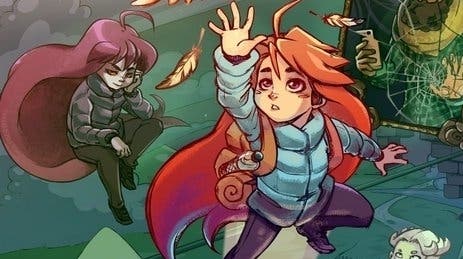
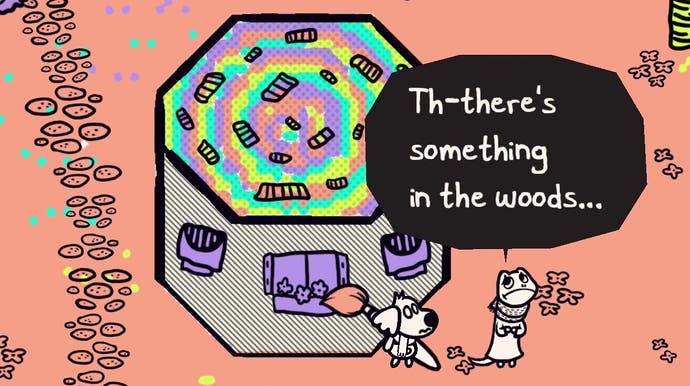
Your work is always full of character that musically reflects each game you work on, its settings and protagonists. What do you see as the key role of music in video games generally? Is it part of the storytelling or accompaniment?
The biggest thing to me is that the music always reflects the player's experience. I've said this a lot, but game scores are primarily about giving the actions you as a player take even more agency and importance. If you're not bolstering the feeling of playing a game, all you're doing is scoring a still image or a film. So, when writing background music for an area, you're scoring the player exploring that area. When writing a character theme, you're writing it from the perspective of the character, how they might perceive that character. I think doing that makes the experience far better, and allows for a lot of choices you might not otherwise make. Maybe you shouldn't have music for this entire stretch of time because it feels right for the moment? How does taking that away feel? It's all part of the score!
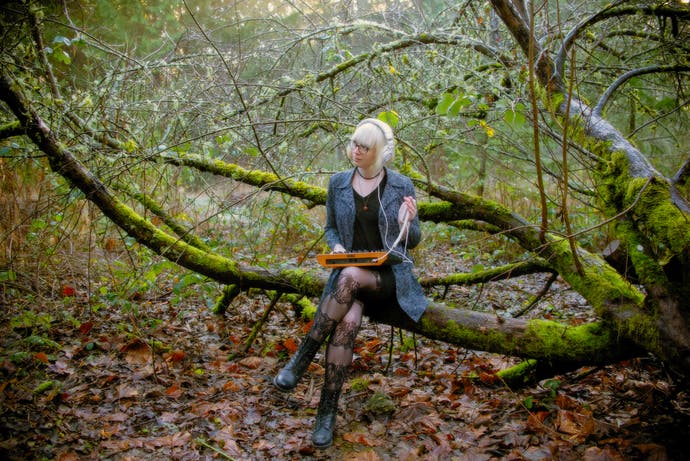
I'm a big fan of Chicory and was particularly taken with the Song of the Wielders atop the mountain as this musically climactic moment. How did the composition of this song come about? What emotions were you hoping to convey?
It was important to give that sense of worldbuilding to the moment, for the creator Greg Lobanov and myself. He wrote the lyrics for the song, so all I really wanted to do was capture the feeling of singing alongside your new best friend and mentor.
Also was your dog in Chicory called Pizza or something else? For me they'll always be Spaghetti!
For me, the little dog was Marzipan. It's also the name of the character based on me! Which leads to some fun easter egg dialogue if you choose that name.
Harmony: The Fall of Reverie is set for release on 8th June across PC and Switch, with a PlayStation and Xbox release following on 22nd June.


